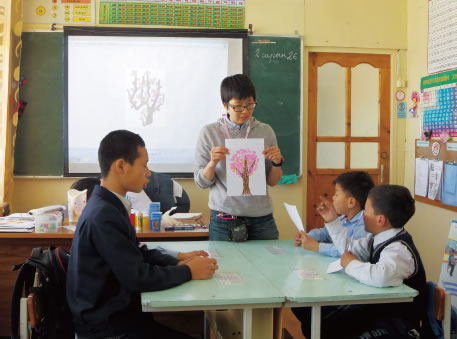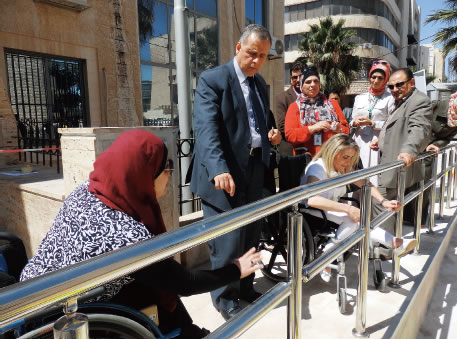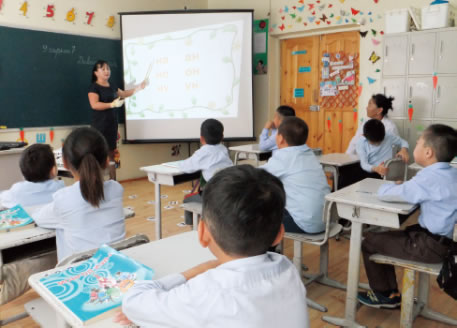(4) Disparity Reduction (Assistance for People who Tend to be in Vulnerable Situations)
Ongoing efforts are being made to implement the 2030 Agenda. Meanwhile, a number of issues such as difficulty in identifying where problems lie and addressing them properly from the broader national level are brought to light. “Increase of disparities” is one of them. Moreover, challenges such as poverty, conflict, infectious diseases, terrorism, and natural disasters have varying impacts depending on the situations that individuals are in, including their country and region, or whether they are women and/ or children. To deal with this situation, it is effective and essential to adopt an approach in a form that takes the standpoint of individual people.
<Japan’s Efforts>
| Human Security
Japan places priority on the principle of “human security.” This concept focuses on each individual, and seeks to build states and communities by protecting and empowering individuals so that they can live in dignity, free from fear and want.
To advance human security, the Government of Japan undertakes a variety of efforts, both to (i) promote the concept and to (ii) put it into practice.
(i) For promoting the concept, Japan has played a leading role in establishing the Commission on Human Security, which is an international commission of experts, and its successor the Advisory Board on Human Security as well as convening the informal, open-ended forum Friends of Human Security. Furthermore, Japan led the adoption of two UN resolutions and made efforts to work out the definition of the concept. The UN General Assembly unanimously adopted a resolution concerning a common understanding on human security in September 2012 under Japan’s leadership.
(ii) For putting the concept into practice, Japan spearheaded the launch of the UN Trust Fund for Human Security in 1999. Japan has thus far contributed approximately ¥45.17 billion in total, and supported 238 projects in 88 countries and regions contributing to ensuring human security, implemented by UN agencies (all figures as of the end of December 2016). In the new Development Cooperation Charter approved by the Cabinet in February 2015, human security is defined as the guiding principle that lies at the foundation of Japan’s development cooperation.

| Assistance for Persons with Disabilities

A Japan Overseas Cooperation Volunteer, Ms. Asuka Sawada teaches children with disabilities at the 1st school of Dornod province in Eastern Mongolia. In arts and crafts class, she teaches creative activities which make full use of the children’s imagination. (Photo: Takako Tsukagoshi)
It is important that capacity building and community development are promoted to ensure the social participation and inclusion of people in vulnerable situations in society, such as young people and women, especially persons with disabilities.
It is Japan’s policy to pay due attention to the socially vulnerable, including persons with disabilities, when planning and implementing ODA policies for development cooperation. Policies for persons with disabilities cover a number of different fields, including welfare, health and medical care, education, and employment. Japan has utilized the techniques and experiences Japan has accumulated in these fields through ODA and NGO activities to promote measures for persons with disabilities in developing countries. For example, Japan carefully tailors its assistance to various local needs, such as promoting barrier-free railroad infrastructure and airports, building vocational training center and rehabilitation facilities for persons with disabilities, and providing minibuses for their transportation.

Improvement of a barrier-free environment is important for supporting the employment of people with disabilities in Amman, the capital of Jordan. The conditions on the angles of slopes, materials and handrails on the way to the Ministry of Labor in Jordan were improved by support from Japan. (Photo: Yahoko Asai / JICA Expert)
Additionally, through JICA, Japan provides a range of technical cooperation to enhance the capacity of organizations and personnel offering assistance to persons with disabilities in developing countries. Included among these efforts are the acceptance of trainees from developing countries and the dispatch of JOCVs and a variety of experts, including physical and occupational therapists and social workers.
In January 2014, Japan ratified the Convention on the Rights of Persons with Disabilities. The Convention established independent clauses setting out that states parties would undertake measures for international cooperation and its promotion (Article 32). Japan continues to contribute to increasing the rights of persons with disabilities in developing countries through ODA and other means.
•Mongolia
The Project for Strengthening Teachers’ Ability and Reasonable Treatments for Children with Disability
Technical cooperation project (August 2015 – )

A Mongolian language class at Special School No.25 in Ulaanbaatar City (Photo: Kiyoshi Otomo)
In Mongolia, with respect to the education for children with mental or physical disability, there are some issues such as difficulties of being unable to receive enough support from the late detection of disability, of being stuck with poverty due to their parents’ unstable job status or of the scarcity of the number of schools that can extend education to those children. Moreover, professional training on how to treat and teach handicapped children has not been extended for a long time at the teacher training course in Mongolia. As a result, there are quite a few handicapped children who have been unable to receive appropriate education according to the degree of their disability and go to school.
In response to these issues, Mongolia has endeavored to develop legal systems to ensure that people with or without disability can have all opportunities equally. Moreover, in order to achieve developmental support and education improvement for children with disability, Mongolia asked Japan for assistance, and in 2015 the Project for Strengthening Teachers’ Ability and Reasonable Treatments for Children with Disability was commenced.
In order to develop the system of early detection of disabilities and developmental support in pilot areas which are selected from Ulaanbaatar City and regional cities, this project aims to establish a model for the early detection of disabilities, developmental support and education for the handicapped through extending improvements in capacity of teachers for quality education to the pilot schools, four special schools for the mentally handicapped and eight regular schools.
Regarding the development of the system for the early detection of disabilities and developmental support, Japan held consultations with the institution in charge, the Commission of Health, Education and Social Protection for Children with Disability, and is compiling the steps from the detection of disabilities to developmental support and the roles of the related institutions into manuals. Furthermore, Japan has reviewed the tools for screening and assessment that Mongolia has been using to date and studied the tools that will be necessary. Currently, the localization into Mongolian use of two tools that are being used in Japan is under way.
With respect to strengthening the capabilities of the teachers, study sessions have been held for the teachers (approximately 200) at the four pilot special schools at the frequency of twice a month in the first year and once a month in the second year. Through the study sessions, the Mongolian formats of individual educational plans were prepared and the teachers’ understanding of the value of establishing plans has deepened. Japan makes efforts to establish the system that allows the handicapped children to study at local regular schools by encouraging collaboration between the eight pilot regular schools and the special schools.
Japan will continue activities that enable children to acquire appropriate developmental support and education tailored to their individual needs.
In May 2016 the Project for Promoting Social Participation of Persons with Disabilities in Ulaanbaatar City was also commenced separately from this project. It is boosting the realization of an inclusive society in Mongolia by working on consistent cooperation from the entry point (early detection) to the exit point (social participation) of support for persons with disabilities. (As of August 2016)
